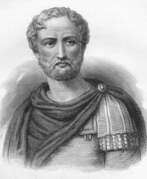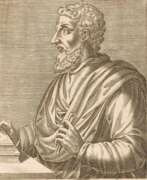Jurists Ancient Rome


Gaius Pliny Secundus (Latin: Gaius Plinius Secundus), known as Pliny the Elder, was an ancient Roman polymath, writer and statesman.
Pliny came from a wealthy family and was educated in Rome. In military service in Germany, he rose to the rank of cavalry commander, and then returned to Rome and was appointed governor of the province. In addition to public affairs, Pliny was engaged in the study of nature, wrote various scientific works.
His book Natural History has reached our time. This is an encyclopedic work, which became an authority in Europe in scientific matters until the Middle Ages. Natural History has historical significance as one of the greatest literary monuments of classical antiquity. It is still of value to those who wish to gain an insight into first-century Rome from a primary source.
In the year 79 Pliny was appointed by Vispasian to command a fleet in the Bay of Naples, and found himself near Vesuvius at the time of its eruption. He went ashore, where he died as a result of the natural disaster.


Marcus Terentius Varrō, sometimes called Varro of Reatinus, was an ancient Roman scholar-encyclopedist and writer.
Varro was a very prolific writer: the titles of his 74 works are known, totaling 620 books. Varron was engaged in logic, language, poetry, history, law and geography, history, art, history of literature, theory of music. Judging by the surviving accounts of his contemporaries, the most significant of Varron's lost works were "Divine and Human Antiquities" (Antiquitates rerum humanarum et divinarum) in 41 books and "Portraits" (Imagines) in 15 books, which contained biographies of famous Greeks and Romans, as well as 700 portraits that illustrated the text. The treatise "On Agriculture" (De re rustica) in three books has survived in complete preservation.